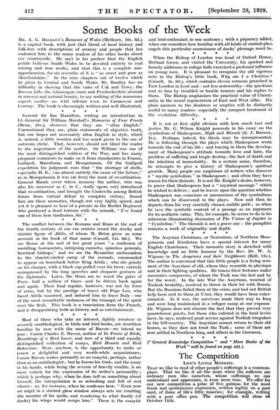It is not at first sight obvious with how much
tact and
justice Mr. G. Wilson Knight proceeds in his essay on the symbolism of Shakespeare, Myth and Miracle (E. J. Burrow, -
2s.). Perhaps, indeed, his thesis may be misrepresented. He is following through the plays which Shakespeare wrote
towards the end of his life ; and tracing in them the develop- ment of Shakespeare's attitude towards love and hate, the problem of suffering and tragic destiny, the fact of death and the intuition of immortality. In a certain sense, therefore, he attempts to give a history of Shakespeare's spiritual growth. Many people are suspicious of writers who discover a " mystic symbolism " in Shakespeare ; and often they have reason for their distaste. It is not Mr Knight's desire, however, to prove that Shakespeare had a " mystical message " which he wished to deliver ; and he leaves open the question whether Shakespeare was conscious or unconscious of the symbolisms which can be discovered in the plays. Now and then he departs from his very carefully chosen middle path ; as when he rues the symbolic content of a passage as an argument for its aesthetic value. This, for example, he seems to do in his otherwise illuminating discussion of The Vision of Jupiter in " Cymbeline." The blemish is not a grave one : the pamphlet
remains a work of originality and depth. * * * *


































 Previous page
Previous page